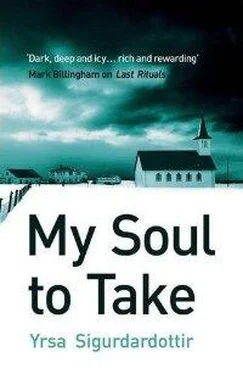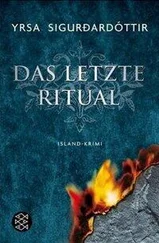“No we don’t,” Thóra assured him. “We’re simply trying to get to the bottom of what happened. Nothing else.” She smiled. “Please excuse us if we sounded aggressive or accusatory; that wasn’t our intention.”
“If you say so,” Magnús answered warily. “The fact is, I’ve been ill and I wanted a little rest. Experience has taught me that solitude is the best nourishment for the body, to say nothing of the soul. It’s just not that easy to find these days in all the hustle and bustle of modern life.”
“So why did you choose this hotel? It specializes in homeopathy and spiritualism, and I hope you don’t take it as an insult if I say that neither are likely to appeal to your generation.”
He smiled for the first time since he’d opened the door. “You’re quite right: I don’t believe in that nonsense. I came here because I grew up in this part of the country. I was raised on a farm not far from here. ‘Strong is the bond that draws men back to the soil their fathers ploughed,’ as the poem says.”
Thóra’s eyes widened. “Really? You know the people from the farm?”
Magnús was baffled. “Yes, actually, I did. Does that matter?”
“Probably not. I just know that Birna was very interested in the history of the farm, and I have a hunch that it’s somehow connected with her death, but I have nothing to back it up.”
Magnús’s face had gone pale. “Isn’t that a bit of a long shot?” His voice quavered slightly.
Studiedly casual, Thóra said, “Yes, I’m sure it is. But it’s great that you’re familiar with this place. Maybe you could tell us a little about the local history, or any ghost stories you might know?”
Magnús seemed lost for words. He cleared his throat and appeared to recover his composure. “I don’t believe in ghosts, and haven’t listened to that kind of talk since I was a child. Those stories have been going around here for a long time, but you’ll have to ask someone else.” Magnús had slumped a little in his chair, but he straightened up before continuing. “I’m no historian, and at the time I didn’t have enough interest in my family tree to bother digging up details of what went on here in the old days, so I won’t be much use to you.”
“But you knew the farmers who lived here, didn’t you? That man … what was his name again … ?” Thóra tried to remember what had been written on the backs of the photographs. “Björn something?”
Magnús sat frozen, as if rooted to his seat. “Bjarni, Bjarni Thórólfsson, from Kirkjustétt.”
“That’s right!” exclaimed Thóra. “Didn’t his brother live on the farm next door?”
“Yes, Grímur from Kreppa was Bjarni’s brother.” Magnús grimaced. “Grímur qualified as a doctor. He was older than Bjarni. A terrible tragedy, the whole business with those two. But fate and fortune do not always go hand in hand, as the sagas say.”
“Really?” Thóra was curious. She’d had a bad feeling about the photographs at the time, but she’d assumed that was because everyone in them had died and been forgotten. It had made her uncomfortable to have evidence in black-and-white of how quickly lives pass into oblivion, but perhaps something else lay behind her uneasy feeling. “How come?”
Magnús groaned. “Their father was one of the main operators of fishing schooners out here on the peninsula. He also ran two fishing stations with rowing boats and became very wealthy. Maybe nothing like cod traders or bankers these days, but by the standards of the time he was very well-off. I can’t remember how many schooners he owned, but it was quite a few. He was based in Stykkishólmur.”
“Did the brothers run the business with him?” asked Thóra.
“No,” replied the old man. “Before they came of age, he’d got rid of the fishing operation and invested the money in land. He bought a large proportion of the farming land on the southern side of the peninsula. It was a very smart move, because the fisheries took a dive soon afterward. The trawlers took over and most, if not all, of the old schooner companies went bankrupt.”
“So did he know that was about to happen?”
“No, he wasn’t psychic, if that’s what you mean. He just didn’t want his sons to go to sea. He’d seen too many young men drowned or injured to want his sons to go the same way. He sent them to Reykjavík to be educated when they were still young. Grímur was a brilliant scholar and became a doctor, as I said, but Bjarni was less bookish. He was always good fun, sociable, a bit of a practical joker. Nowhere near as serious as his elder brother. It would be hard to find two more different brothers. You should bear in mind that this isn’t a firsthand account; I heard it from my father, but he was a truthful man and not given to embellishing his stories.”
“So was Grímur the local doctor here?” Thóra asked.
“Yes, he moved back and had the farm called Kreppa built. He did some farming alongside his medical duties, because he couldn’t earn a living as a doctor here. He tried to make farming his main occupation, but he wasn’t very successful. When Bjarni devoted himself to farming, on the other hand, he flourished. Later he made a lot of money from investments.”
“So where’s the tragedy?” pressed Thóra. It all sounded pretty positive so far.
“Tragedy, ah, yes,” Magnús said gravely. “Love was to blame, as is often the case. Bjarni was married very young, to an exceptionally fine woman. Her name was Adalheidur.” The old man’s expression was almost wistful. “I was just a lad, but I’ll never forget her. She stood out from everyone around her. She was the most beautiful woman in the area, and friendly too. She worked hard. Bjarni met her in Reykjavík, and when they moved here, she knew absolutely nothing about farming. She always dressed as if she were on her way to a party, you know the type. Understandably, the locals didn’t have much faith in her as a farmer’s wife, but she proved them wrong. Made an effort to learn how it all worked. It took a lot of grit and hard work, but she soon silenced her detractors, I can tell you.
“Kristrún, Grímur’s wife, was completely different. She was from these parts, hardworking like Adalheidur but not in the same way. She slogged away very reliably, but Adalheidur always had a smile on her face and laughed if anything went wrong. They were good matches for their husbands, that’s for sure. Bjarni was very jolly, but Grímur always had a face like thunder.”
“Did Adalheidur die young?” asked Thóra suddenly, remembering the woman’s disappearance from the photographs.
“Yes.” Magnús sighed. “They had a child, a little girl called Gudný. A beautiful girl, the spitting image of her mother. Not long before, Grímur and his wife had had a daughter too. Her name was Edda, but she died around the time Gudný was born and that caused friction between the two women. Grímur’s wife accused Adalheidur of poisoning her daughter, which was preposterous, but the woman was beside herself with grief and probably not in her right mind when she said it.
The brothers’ friendship cooled, so much so that they weren’t on speaking terms any longer by the time disaster struck.”
“Disaster?” echoed Thóra.
“Yes, Adalheidur died of blood poisoning and they say Grímur’s wife went crazy. Nobody saw her for years, so the two brothers were left behind: one a young widower with a baby daughter, and the other with a mentally ill wife but no children. Their pride prevented them from rebuilding their friendship, so each of them battled his private demons alone. Then Grímur and Kristrún had another daughter much later. Her name was Málfrídur; she was born just before the war. The wife supposedly died in childbirth, although there was a rumor that she committed suicide and Grímur fiddled the death certificate. He wrote it himself. But I don’t think there are any grounds for believing that: by that time Kristrún was getting on a bit, and childbirth is more difficult for a woman as she gets older, as you know.”
Читать дальше












